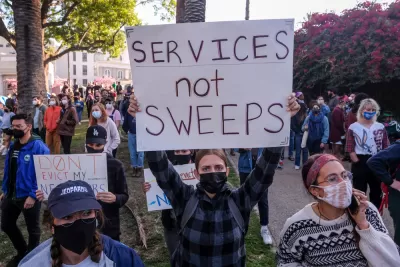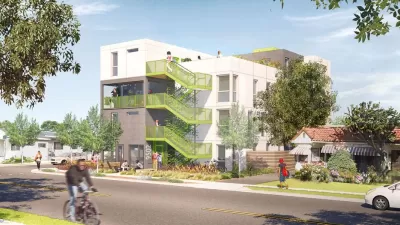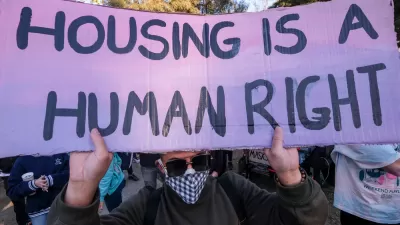Advocates say L.A.'s new focus on clearing 'unsightly' homeless encampments is a political band-aid that won't help people find permanent housing.

Benjamin Oreskes and Doug Smith report on a new policy in the city of Los Angeles aimed at clearing homeless encampments that critics say is an inhumane and politically motivated solution to a much bigger problem.
The approved motions authorize the city to post signs notifying people camped in the designated locations that they have 14 days to leave. Outreach workers will offer shelter beds to everyone affected to keep the city in compliance with a federal court ruling that prohibits the ticketing or arrest of anyone for camping in a public space when no shelter is available.
So far, City Council members have suggested close to 300 locations to designate as off-limits to camping. According to the article, Mayor Eric Garcetti called the policy a balance between the needs of unhoused people and pressures from neighborhood groups. Advocates for the unhoused say that "the change in policy elevates politics over need, creating a squeaky-wheel strategy of clearing those street encampments that have become the biggest liabilities to members of the City Council."
Over 40,000 people experience homelessness in Los Angeles each year, with that number far outpacing the supply of shelter beds or transitional housing. Earlier this year, Councilmember Mitch O'Farrell received widespread criticism during what many perceived as an aggressive clearing of an encampment in Echo Park. While the council has voted to fund more outreach and supportive housing programs, some activists argue that temporary housing solutions like the tiny home villages built this year don't go far enough to provide long-term solutions for unhoused people, who often fall back into homelessness after relocating to transitional housing.
FULL STORY: L.A. just changed its entire approach to homelessness. Does it place politics above need?

Alabama: Trump Terminates Settlements for Black Communities Harmed By Raw Sewage
Trump deemed the landmark civil rights agreement “illegal DEI and environmental justice policy.”

Planetizen Federal Action Tracker
A weekly monitor of how Trump’s orders and actions are impacting planners and planning in America.

Why Should We Subsidize Public Transportation?
Many public transit agencies face financial stress due to rising costs, declining fare revenue, and declining subsidies. Transit advocates must provide a strong business case for increasing public transit funding.

Understanding Road Diets
An explainer from Momentum highlights the advantages of reducing vehicle lanes in favor of more bike, transit, and pedestrian infrastructure.

New California Law Regulates Warehouse Pollution
A new law tightens building and emissions regulations for large distribution warehouses to mitigate air pollution and traffic in surrounding communities.

Phoenix Announces Opening Date for Light Rail Extension
The South Central extension will connect South Phoenix to downtown and other major hubs starting on June 7.
Urban Design for Planners 1: Software Tools
This six-course series explores essential urban design concepts using open source software and equips planners with the tools they need to participate fully in the urban design process.
Planning for Universal Design
Learn the tools for implementing Universal Design in planning regulations.
Caltrans
Smith Gee Studio
Institute for Housing and Urban Development Studies (IHS)
City of Grandview
Harvard GSD Executive Education
Toledo-Lucas County Plan Commissions
Salt Lake City
NYU Wagner Graduate School of Public Service





























